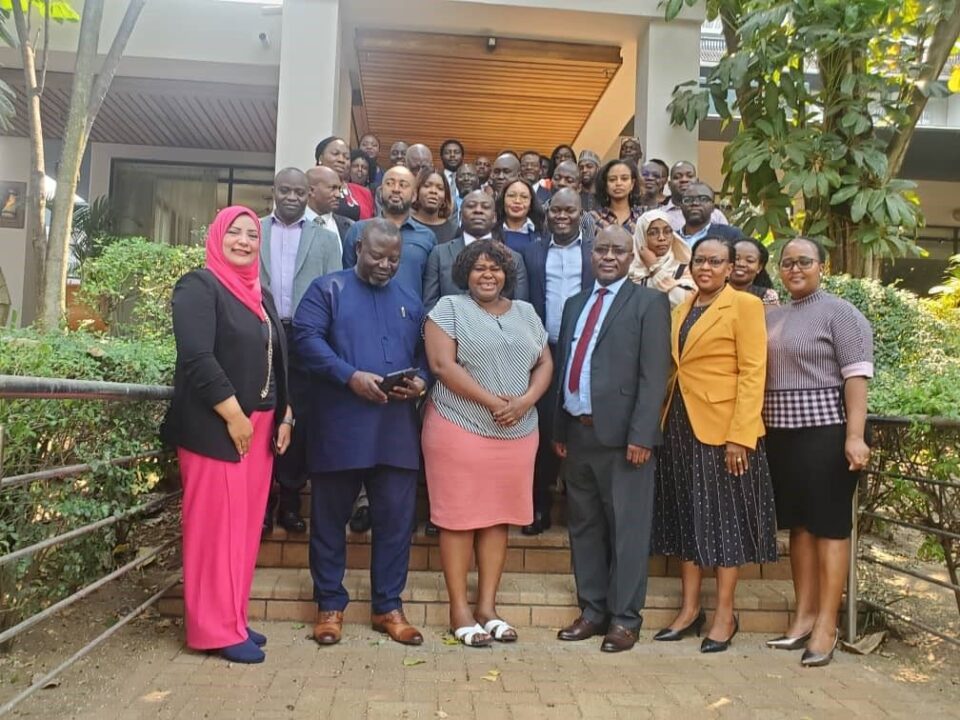PHOTO: Participants at the workshop at the African Union Commission
By Judoemue M. Kollie, judoemuekollie@gmail.com
A three-day capacity building workshop on domesticating the AU strategic framework for holistic aflatoxins control within the African continent has concluded in Lusaka, Zambia with the call for African countries to mainstream aflatoxins control into their respective national programs.
The meeting ran from October 2-3 in Lusaka organized by the African Union Commission (AUC) Partnership for Aflatoxins Control in Africa (PACA), a program that supports aflatoxins mitigation and control across the continent.
It brought together high level delegates from diverse background of agriculture and health, researchers, academia, policy makers, private sector actors from several African countries including Liberia.
The main objective of the conference was on domesticating the AU strategic framework for holistic aflatoxins control is to raise awareness on the PACA aflatoxins controlled model and the tools within the strategic framework for implementation at regional and country level.
Aflatoxins are naturally occurring, highly toxic compounds which occur widely in diverse food and feed products such as groundnuts, maize, rice and sorghum. Research indicates that aflatoxins is one of the most pervasive food safety problems in Africa as contamination of food crops begins from the field and continues during postharvest aggravated by climatic conditions and agricultural practices.
(L-R0-Winta Sintayehu, Senior Program Officer PACA
The contamination of aflatoxins is said to immensely impact sectors such as health, trade and agriculture, making its control very complex and challenging.
PACA was therefore, launched by the AUC in October 2012 as endorsed by African Union Executive Council through Decision No. EX.CL/768 (XXII), to coordinate and support aflatoxin mitigation and management across the health, agriculture and trade sectors in Africa.
The organization works at the continental, regional and country levels. At continental level, PACA has created a continent-wide comprehensive program on aflatoxin control while addressing a broad array of solutions and actions on the ground.
Also at regional level, PACA works with Regional Economic Communities (RECs), to develop regional aflatoxin control action plans which increase effective aflatoxin control along agricultural value chains, advocate for enabling policy environment, and harmonize aflatoxin standards.
According to PACA, as continent moves into the Africa Continental Free Trade Area (AfCFTA), regional blocks will need strong and effective trade measures to support countries in their efforts to integrate into the African markets as well as access lucrative international markets.
PACA’s Senior Program Officer for West and Central Africa, Winta Sintayehu explained that aflatoxins control is a very crucial food safety issues on the continent.
She said that over the years PACA has worked with some countries within the continent to control the effects of aflatoxins.
“We encouraged countries to use the strategic framework that had been developed by PACA and being endorsed by ministers of agriculture of member states to help them in the management of aflatoxins. This strategic framework will the control to use the PACA model to control aflatoxins,” she explained.
Through PACA, the Commission has worked with six AU member countries including, Malawi, Nigeria, Senegal, Tanzania, The Gambia and Uganda to pilot the models for holistic country-led approaches for aflatoxin control and these counties have successfully mainstreamed aflatoxin control in national systems.
Sintayehu said that the experience from the pilot countries had been very fruitful and rewarding and as such the AUC is now thinking on scaling up the process in all of the African countries.
According to her, PACA wants to see other countries to replicate the country led model to manage aflatoxins.
She mentioned that countries currently benefitting from the program were selected based on a rigorous set criteria, stating that those countries have been able to buy into the initiative.
She stressed the need for governments of countries to mobilize resources toward the mitigation of aflatoxins.
Meanwhile, twelve new countries have been added to the PACA program, namely Zambia, Egypt, Kenya, Angola, Ethiopia, Mali, Togo, Cameroon, Burkina Faso and Benin.

